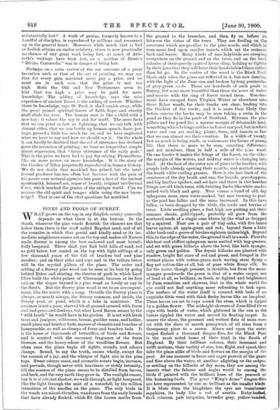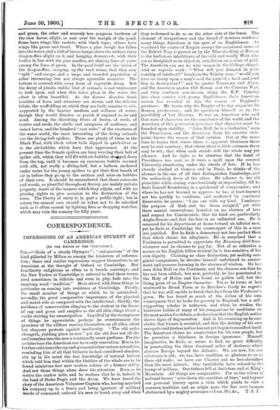PINES AND POOLS OF SURREY.
WHAT grows on the top in any English county generally depends on what there is at the bottom. In the South, wherever the pine woods flourish the chances are that below them there is the stuff called Bagshot sand, and of all the counties in which that genial and kindly sand or its im- mediate neighbours comes out on the top and makes all Nature smile, Surrey is among the best endowed and most bounti- fully bespread. There shall you find bold hills of sand, red as gold below, but coated on the top with light siftings of a few thousand years of the fall of bracken leaf and pine needles ; and on their sides and tops and in the valleys below will be the myriad pillars of the pines. The order and setting of a Surrey pine wood can be seen at its beat by going behind Esher and skirting the theatre of park in which Lord Clive built the white palace of Claremont, because at its foot and on the slopes beyond is a pine wood as lovely as any in the South. But the Surrey pine wood is set to an accompani- ment, like the music with a song. Outside the Surrey pines is always, or nearly always, the Surrey common, and inside, the Surrey pool, or pond, which is a lake in miniature. The common is not a poor, starved bit of ground covered with furze and bad grass and donkeys, but what Lord Bacon meant by the "wild heath" he would have in his garden. It is set with birch trees and junipers, wild roses, broom, gaelder roses, and hollies, small pines and heather beds, masses of clematis and bunches of honeysuckle, as well as clamps of furze and bracken beds. It is the home of thousands of butterflies, of birds and flowers, and is scented with the cocoanut fragrance of the furze blossom and the honey-odour of the woodbine flowers. But when once the pines begin all sights, sounds, and odours change. Sound, to say the truth, ceases wholly, except for the screech of a jay, and the whisper of light airs in the pine tops. Sweet odours cease, and aromatic scents begin, increase, and pervade, though never with heaviness or sickly intensity, till the essence of the pines seems to be distilled from leaves, and bark, and the-very earth they grow in. The sunlight ceases, but it is shade,not shadow, we walk through, or light tempered, like the light through the mist of a waterfall, by the million interstices of the needles on the pines. The only birds in the woods are missel-thrushes, wanderers from the early broods that have already flocked, which flit like brown moths from the ground to the branches, and then fly on before between the vistas of the trees. They are feeding on the creatures which are peculiar to the pine woods, and which in turn must feed upon smaller insects which eat the resinous bark and leaves. Many kinds of rare ladybirds are creeping everywhere on the ground and on the trees, and on the bark colonies of their queerly spotted larvw cling, holding so tightly by their jaws that they will leave their heads behind them rather than let go. In the centre of the wood is the Black Pool, black only when the pines are reflected in it, but now dancing with the light of the June sun, and broken by long peninsulas of grey-green reeds. There are hundreds of such pools in Surrey, but none more beautiful than these six acres of water and mosses with the ring of forest round them. Roe-deer must have escaped from Virginia Water or elsewhere into these Esher woods, for their tracks are clear, leading into the thickest of the reeds; and it is more than likely that before sunrise the bucks may be seen taking a swim in the pond as they do in the pools of Scotland. Between the pine pillars and the pond lies a narrow margin of debateable land, something which belongs neither to forest nor pool, but inwhkb water and sun are making plants, trees, and insects so fast that we can almost see their creation. In a width of twenty feet so much is being made, so various are the forms of young life, that there is more to be seen, counting differences and not numbers, than in half a mile of the pine wood. On one border it makes the fringe of the forest, on the other the margin of the waters, and midway water is changing into land. At the foot of the outer row of pines is the heather, with purple bells already opening their mouths, and matted among the heath white curling grasses. Here is the last limit of the creatures of the dry heath and sun, the lizards, grasshoppers, and big heather spiders, and set here and there in this heather fringe are old birch trees, with twisting limbs like white snakes netted with black and grey. Next comes a band of old, dry sphagnum moss, once water-soaked, but now tinning to peat, as the pool has fallen and the moss increased. In this have fallen, or been dropped by the birds, the seeds and berries of trees. Little seedling pines, a foot high, are putting out their summer shoots, gold-tipped; probably all grew from the scattered seeds of a single cone blown by the wind or dropped by a squirrel. Next are a pair of tiny oaks, with five broad leaves apiece, all apple-green and red; beyond them a little alder bush and a grove of birches eighteen inches high. Beyond this, to the edge of the water, the ground is all in a soak. First the thickest and stiffest sphagnum moss matted with bog-grasses, and set with green hillocks above the level, like bath sponges, only green and golden. The dryest hillocks are planted with sundew, bright flat stars of red and green, and fringed in the wettest places with cotton-grass, each waving stem' flying a flag not cotton-like at all, but of pure white flossy silk. So far the water, though present, is invisible, but from the moss- sponges pondwards the green is that of a water carpet, not of land at all, so brilliant, so fresh, so lighted and brightened by June sunshine and showers, that in the whole world the eye could not find anything more refreshing to look upon. The surface of the water itself is covered with beds of an exquisite little weed with thick fleshy leaves like an ice-plant. These leaves are set in cups round the stem, which is tipped by a golden flower. The midnight showers of June filled these cups with beads of water, which glittered in the sun as the breeze rippled the water and moved its floating carpet. In nearer the shore, the greenest and wettest flats of moss were set with the discs of marsh pennywort, of all sizes from a threepenny piece to a crown. Above and upon the water carpet flashed a thousand dragon-flies, for the Black Pool is the most noted home of their kind in the, South of England. By their brilliant colours, their incessant and swift motions, their variety of size, hue, flight, and speed, they take the place alike of birds and flowers on the margin of the pool. At one moment in fierce and eager pursuit of the gnats and flies above the water, at another alighting on the sedges, or settling on the hillocks of dry moss, they are among the insects what the falcons and eagles would be among* the birds if painted with the brilliant hues of the peacock or the humming-birds. The great "King's Arms" dragon-flies are here represented by one as brilliant as the smanei kinds. It is bluer than the kingfisher, the eyes are translaennt sapphires, its body like a rod of azurite. Ruby-bodied, dark crimson, pale turquoise, lavender grey, yellow-banded, and green, the other and scarcely less gorgeous brethren of the race hover, alight, or soar over the margin of the pond. Some have wings like rackets, with black tops; others have wings like gauze and tinsel. Where a pine bough has fallen into the water, and a tuftof leaves hangs above the surface, these dragon-flies alight on it, and hanging downwards, with their bodies in line with the pine needles, set shining lines of azure among the lines of green. In the pool itself are the larvm of the dragon-flies, creeping up the reed stems, that they may " split " and escape, and a large and crowded population of other interesting but not always agreeable monsters. The bottom is covered with every form of vegetable decay. But the decay of plants, unlike that of animals, is not unpleasant to look upon, and when this takes place in the water the effect is often beautiful. As the tissues dissolve, fresh beauties of form and structure are shown, and the delicate fabric, the scaffolding on which they are built, remains ia Rifle, supported by the heavier medium and stillness of water, though they would dissolve or perish if exposed to air and wind. Among the dissolving fibres of leaves, of reeds, of berries and seeds, the shells and carapaces of molluscs, and insect larvw, and the hundred "cast suits" of the creatures of the water world, the most interesting of the living animals are the diving-bell spiders. There are plenty of them in the Black Pool, with black velvet tails dipped in quicksilver, or in the air-bubbles which have that appearance. At the present time the female spiders are busy weaving their bell of spider silk, which they will fill with air-bubbles dragged down from the top, until it becomes an enormous bubble covered with silk, not really a diving-bell, but a balloon anchored under water for the young spiders to get their first breath of air in before they go up to the surface and seize on bubbles of their own. It should be remembered that these commons and woods, so plentiful throughout Surrey, are mainly private property, waste of the manors which they adjoin, and with no grazing rights to give occasion to the destruction of the trees. The liberty of entry is in part a public right; but in return the utmost care should be taken not to do mischief such as is often caused by lighting fires or dropping matches, which may ruin the scenery for fifty years.



















































 Previous page
Previous page